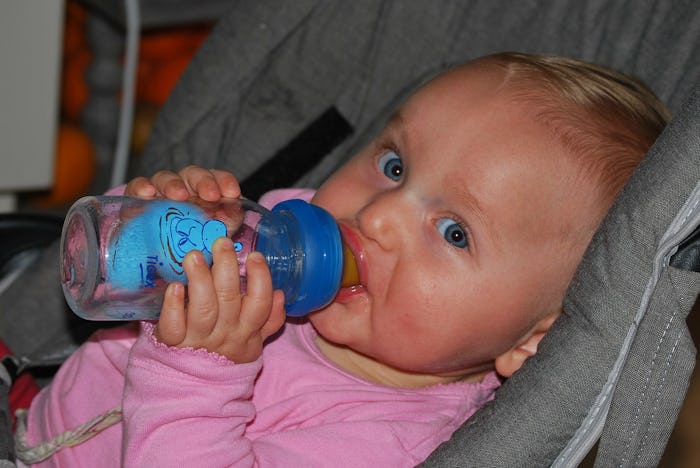Nothing is scarier than the thought of your baby being dehydrated. Whether you breastfeed, formula feed, give your baby solids, or do a combination of it all, dehydration is possible regardless of your baby's diet or age. However, knowing the signs of dehydration and what to do if you notice them can help you get your baby's fluid intake back on track as soon as you can. The first question on your mind if your baby is dehydrated is probably figuring out what to give them to drink. But knowing what happens when you give water to a baby under 6 months may affect your decision. Although drinking water is the common solution for older kids and adults, giving your baby water right away might not be the best solution to their dehydration.
According to Baby Center, dehydration in babies is more common than in older children and adults. It most usually happens when babies are sick or are losing fluids quicker than they can take them in through vomiting, diarrhea, or fever. There are varying degrees of severity when it comes to dehydration in babies, ranging from very moderate to very severe and life threatening, but luckily the signs are pretty easy to spot, even early on.
Parents noted that the common symptoms of dehydration in babies are decreased wet diapers, foul smelling urine, dry lips or skin, decreased amount of tears, or sunken eyes and fontanel (the soft spot on baby's head). Noticing one or two of these symptoms likely means that your baby is moderately dehydrated and needs fluids as soon as possible. However, should you automatically resort to water?
According to What to Expect, for babies 6 months and under, breast milk or formula has all of the nutrients and fluids necessary to keep your baby hydrated. Simply increasing the frequency of feedings or, if they're sick, trying small, more frequent feedings that they're more likely to keep down, can increase their fluid levels very quickly and effectively.
Turns out, water can actually be more harmful than helpful. What to Expect noted that babies can fill up on water, missing out on the nutrition of formula and breast milk. Too much can also lead to oral water intoxication, which is where the electrolytes in your baby's bloodstream become diluted and inhibit normal body functions. In fact, it could lead to low body temperatures or seizures.
In older babies who are already eating solids, giving them some water is fine, but if they're nursing, breastfeeding your baby instead of giving them plain old water will replenish them more quickly. (And keep your supply up.)
If your baby's dehydration is severe, taking them into the hospital where they'll need fluids through an IV to replace them quickly is the best option. Otherwise, your doctor may prescribe other liquids for electrolyte replacement like Pedialite, What to Expect also noted.
Although dehydration can be a frightening thought, knowing that you don't need to resort to a bottle of water immediately, and that your breast milk or formula has all of the nutrients and hydration they need to stay healthy, can give you a plan of attack if you start to notice subtle signs of dehydration.
